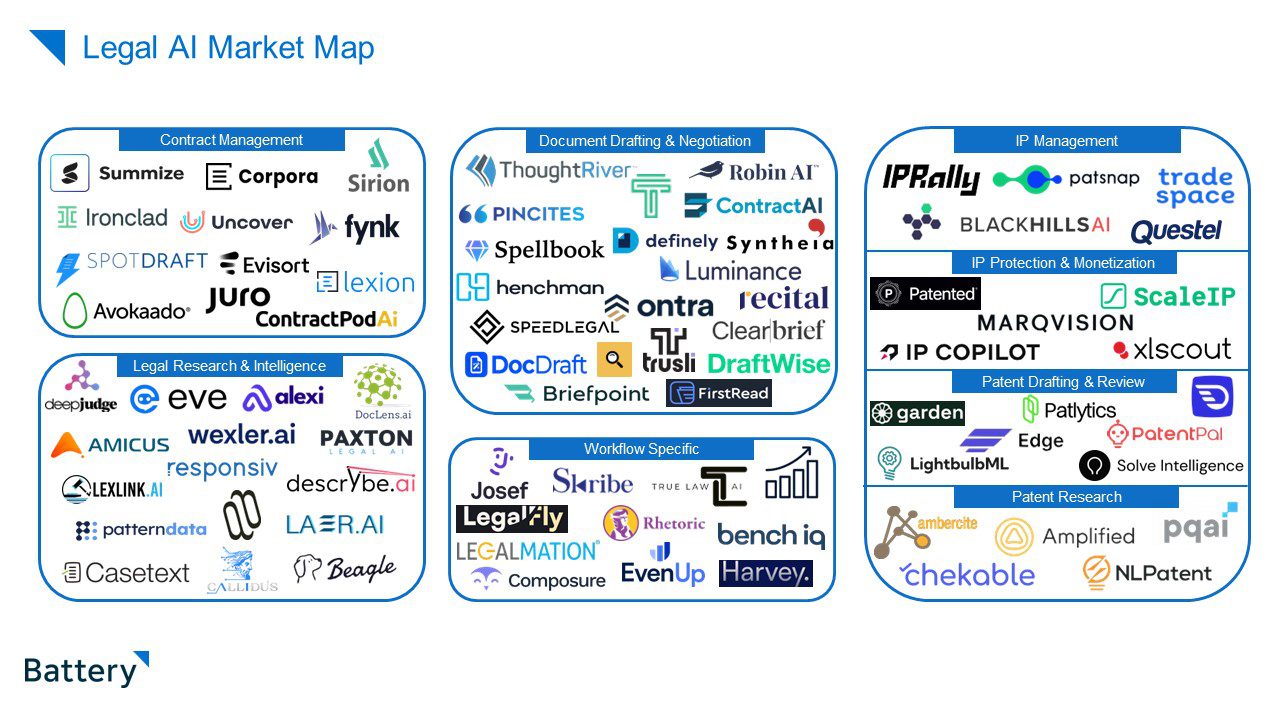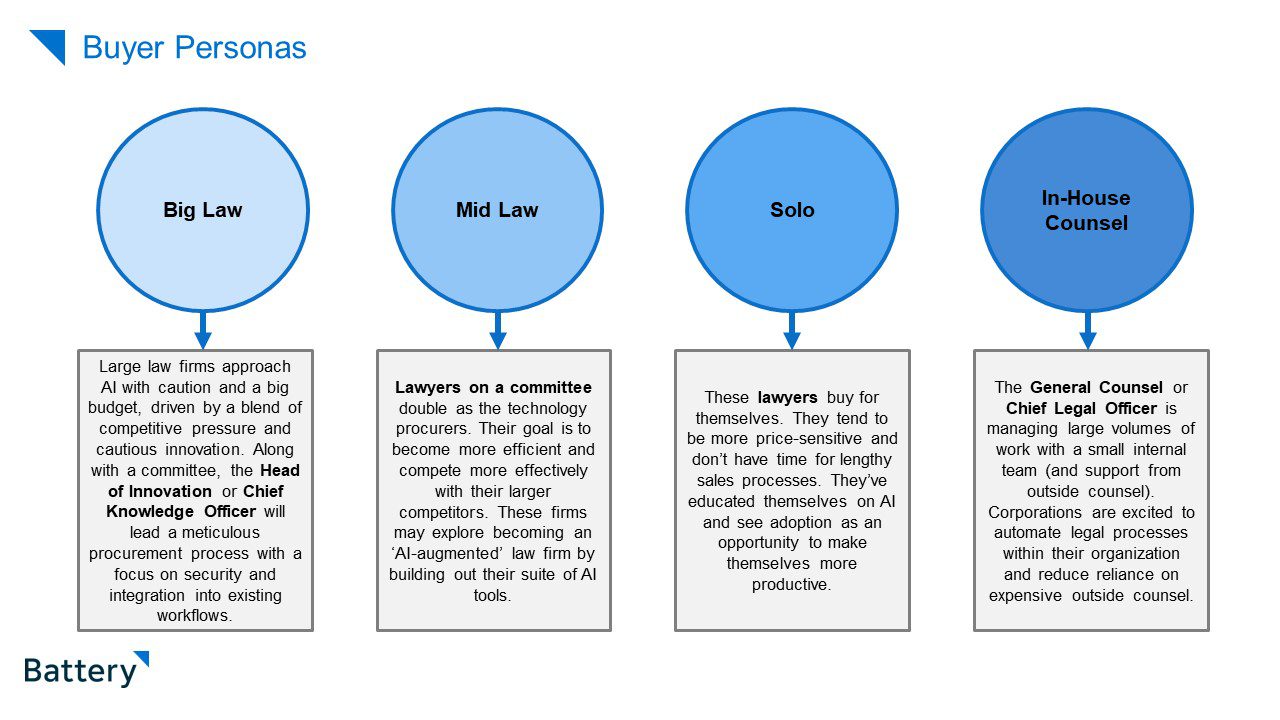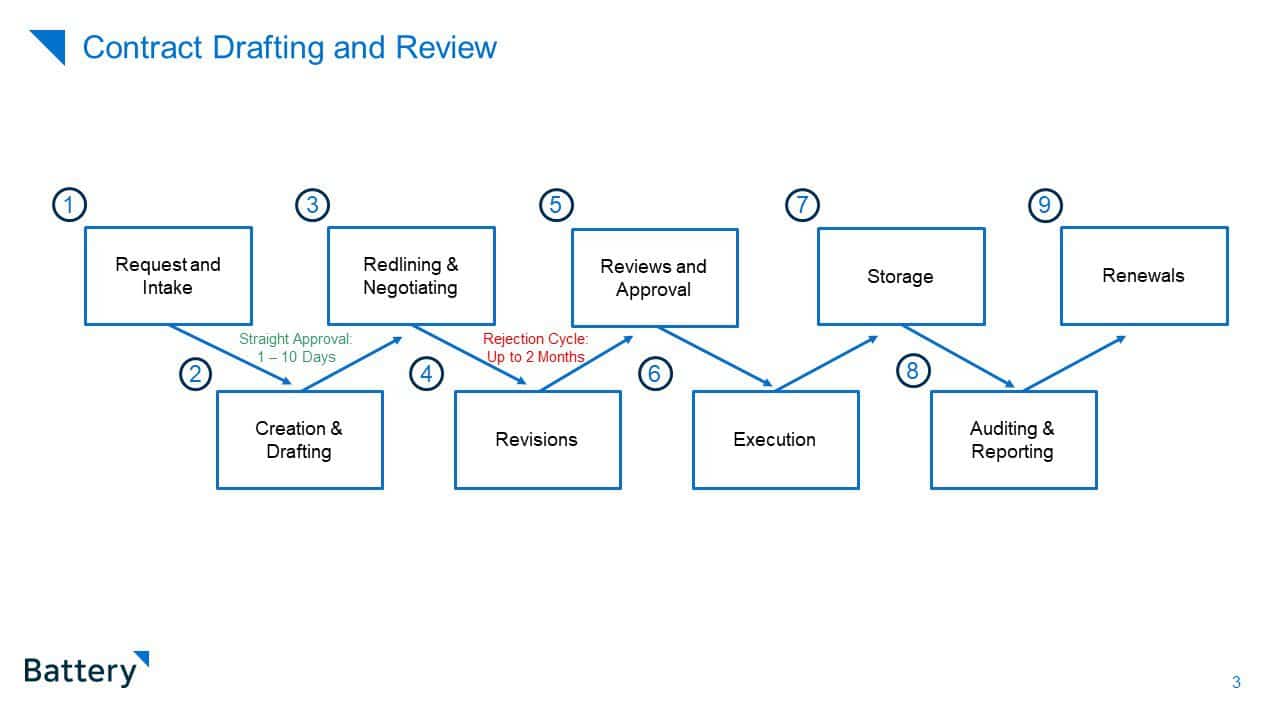At Battery, we’re laser-focused on identifying verticals where AI adoption isn’t just a boardroom talking point, but a seamless solution to real pain points. In our view, healthcare is clearly one of those verticals; government contracting is another. We’re equally enthusiastic about AI’s potential to transform the legal industry.
When we recently attended Legalweek in New York, we saw firsthand how excited the legal community is becoming about AI, too. Nearly all the event programming centered on AI implementation, with attendees eager to learn best practices on how to benefit from AI tools. And for good reason: according to LexisNexis, 90% of law firms plan to increase their investment in generative AI over the next 5 years.
So, what comes next? Through our analysis and conversations with over 70 legal AI startups, we’ve identified three key areas where AI is poised to revolutionize legal workflows:
- Legal Research and Review: AI can streamline discovery and search, quickly identifying relevant data and automating document reviews.
- Contract Drafting and Negotiation: From implementing playbooks to automated hyperlinking, AI can expedite document creation and assist in negotiations.
- Patents and Intellectual Property: We anticipate the emergence of tools that can parse complex documents and identify prior art, completely transforming the patent landscape.

It’s crucial to recognize that the legal AI market is diverse, with distinct buyer personas possessing unique needs, challenges and decision-making processes. Startups targeting large law firms should be prepared to collaborate closely with IT departments and tailor features to each client’s specific workflows. Conversely, startups serving small law firms may find success with a product-led growth strategy that minimizes onboarding requirements.

While data security, change management and the reduction of billable hours present significant challenges, the momentum behind AI adoption in the legal industry is robust. Firms and practitioners who embrace this technology will gain a competitive edge, enhancing their ability to serve clients effectively and efficiently.
Legal Research and Review
Litigation workflows are a perfect example of a process rife with inefficiencies that are neatly addressable by AI. As casework begins, legal teams upload vast collections of documents into repositories and then spend countless hours meticulously sorting through each document to uncover relevant sources and exhibits. Only then can lawyers begin constructing their arguments. This knowledge bank must be revisited multiple times throughout a case’s lifespan, which can span years, necessitating a refresh of the team’s case knowledge every few months. This triggers a repetitive cycle of legal document search-and-review each time the case is revisited.
Tedious legal workflows, such as timeline reconstruction, demand detailed oversight of massive document volumes. Huge amounts of data and proprietary knowledge languish in various document repositories, preventing teams from extracting full potential value.
We see a prime opportunity for AI-powered startups to enable legal teams to parse their data more efficiently, automatically synthesize documents, quickly refresh case knowledge and surface relevant content. By leveraging AI assistance, lawyers can focus more on case strategy and better serve their clients’ needs.
Contract Drafting and Negotiation
We’ve seen many startups target contract drafting and negotiation as a main focus, and for good reason: the technology is clearly ready for primetime in this domain. AI excels at reading contracts and detecting inconsistencies compared to historical documents and internal playbooks. It can also draft red lines and provide negotiation guidelines.
Ontra*, a Battery portfolio company in the AI-contracting space, uses AI to handle the initial 90% of the contract process, with their Ontra Legal Network serving as the human-in-the-loop to finalize contracts for private market clients. We see significant opportunities in this segment for startups to differentiate by focusing on different buyer personas (e.g., biglaw, midlaw, solo) and contract types (from bespoke, highly complex negotiations to high-volume, simple agreements).

Patents and Intellectual Property
Another compelling application of AI within the legal domain is in the realm of patents and intellectual property (IP). Patents are extremely dense, long filings with very technical language. Patents in the U.S. alone are valued at over $3T. The process of getting a patent approved can take up to two years, but the lifetime of the patent is 20 years (as long as the maintenance payments are made on time). Large corporations will protect their patent portfolio with armies of lawyers serving to defend the firm against IP lawsuits and to catch infringements.
And it makes sense why: Patent litigation costs $2.3-$4M in fees on average with patent damages costing the US market over $4.6B annually. The intricate nature of patent language, coupled with the high stakes involved in IP litigation, positions AI as a strong potential ally in this space. We anticipate the development of tools capable of parsing complex documents and identifying prior art, transforming the patent landscape and providing users with unparalleled insight and efficiency.
Conclusion and Market Opportunity
With over 1.3 million active lawyers in the U.S. alone, the potential for AI to reshape the very nature of legal practice is immense. As the industry navigates this transformative period, LLMs are elegantly addressing major pain points in legal workflows that involve vast amounts of unstructured data. Buyer appetite has surged in the past year, and we believe the legal AI reference stack is currently being established.
If you are building in this space, we’d love to talk!
*Denotes a Battery portfolio company. For a full list of all Battery investments, please click here.
The information contained herein is based solely on the opinion of Neeraj Agrawal, Brandon Gleklen and Hailey Wilcox and nothing should be construed as investment advice. This material is provided for informational purposes, and it is not, and may not be relied on in any manner as, legal, tax or investment advice or as an offer to sell or a solicitation of an offer to buy an interest in any fund or investment vehicle managed by Battery Ventures or any other Battery entity. The views expressed here are solely those of the author.
The information above may contain projections or other forward-looking statements regarding future events or expectations. Predictions, opinions and other information discussed in this publication are subject to change continually and without notice of any kind and may no longer be true after the date indicated. Battery Ventures assumes no duty to and does not undertake to update forward-looking statements.

A monthly newsletter to share new ideas, insights and introductions to help entrepreneurs grow their businesses.








